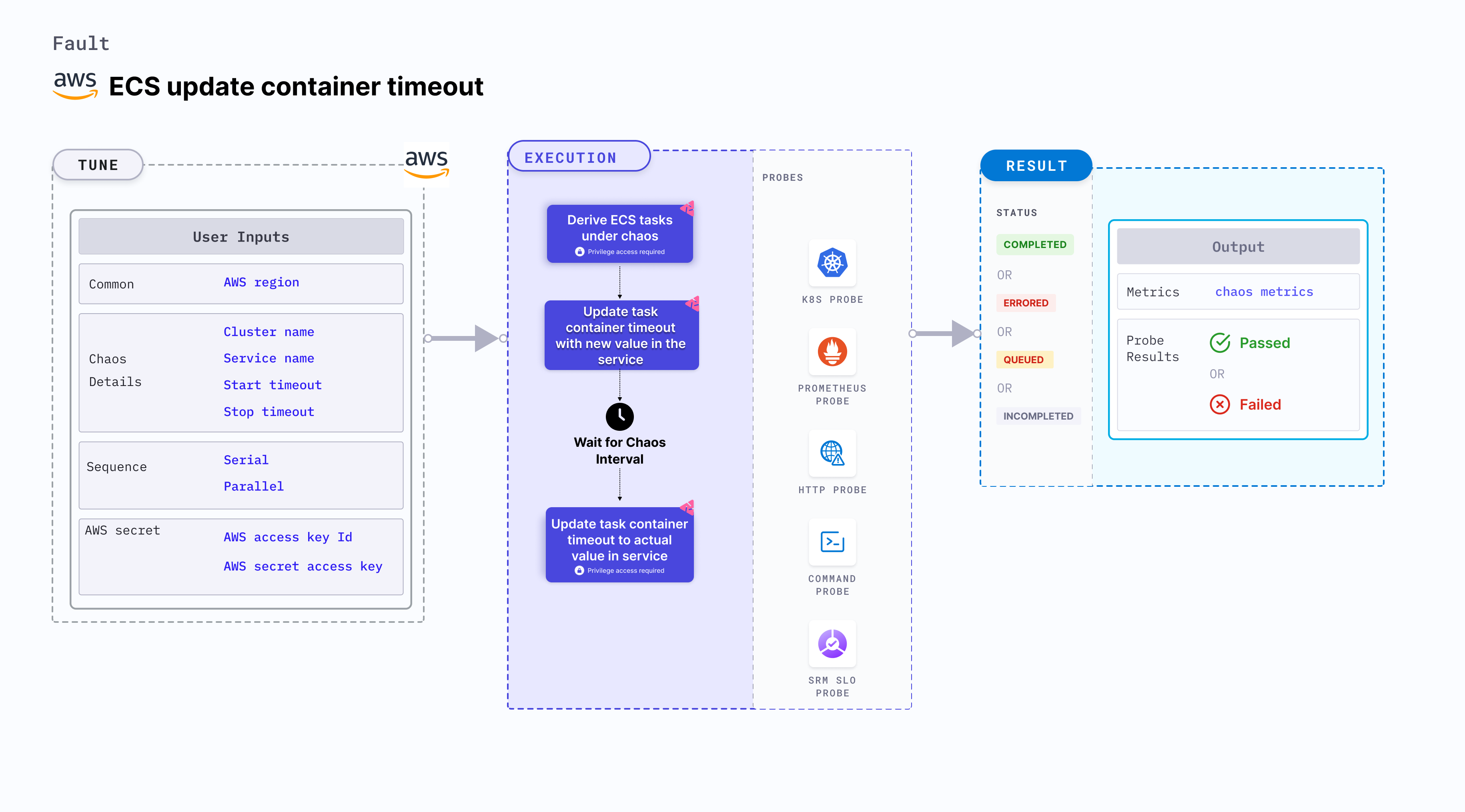ECS update container timeout
ECS update container timeout modifies the start and stop timeouts for ECS containers in Amazon ECS clusters. The fault allows you to specify the duration for which the containers should be allowed to start or stop before they are considered failed. This experiment primarily involves ECS Fargate and doesn't depend on EC2 instances. They focus on altering the state or resources of ECS containers without direct container interaction.

Use cases
ECS update container timeout:
- Tests the resilience of ECS tasks and their containers to timeouts during updates or deployments.
- Verifies the behavior of ECS tasks and their containers when the start or stop timeout is exceeded during updates or deployments.
- Tests the recovery mechanisms of the ECS service and container instances in case of timeouts.
- Simulates scenarios where containers take longer than expected to start or stop.
- Evaluates the impact of above-mentioned scenarios on the overall application availability and performance.
Prerequisites
- Kubernetes >= 1.17
- ECS cluster running with the desired tasks and containers and familiarity with ECS service update and deployment concepts.
- Create a Kubernetes secret that has the AWS access configuration(key) in the
CHAOS_NAMESPACE. Below is a sample secret file:
apiVersion: v1
kind: Secret
metadata:
name: cloud-secret
type: Opaque
stringData:
cloud_config.yml: |-
# Add the cloud AWS credentials respectively
[default]
aws_access_key_id = XXXXXXXXXXXXXXXXXXX
aws_secret_access_key = XXXXXXXXXXXXXXX
HCE recommends that you use the same secret name, that is, cloud-secret. Otherwise, you will need to update the AWS_SHARED_CREDENTIALS_FILE environment variable in the fault template with the new secret name and you won't be able to use the default health check probes.
Below is an example AWS policy to execute the fault.
{
"Version": "2012-10-17",
"Statement": [
{
"Effect": "Allow",
"Action": [
"ecs:DescribeTasks",
"ecs:DescribeServices",
"ecs:DescribeTaskDefinition",
"ecs:RegisterTaskDefinition",
"ecs:UpdateService",
"ecs:ListTasks",
"ecs:DeregisterTaskDefinition"
],
"Resource": "*"
},
{
"Effect": "Allow",
"Action": [
"iam:PassRole"
],
"Resource": "*"
}
]
}
- Refer to AWS named profile for chaos to use a different profile for AWS faults.
- The ECS containers should be in a healthy state before and after introducing chaos.
- Refer to the common attributes and AWS-specific tunables to tune the common tunables for all faults and AWS-specific tunables.
- Refer to the superset permission/policy to execute all AWS faults.
Mandatory tunables
| Tunable | Description | Notes |
|---|---|---|
| CLUSTER_NAME | Name of the target ECS cluster. | For example, cluster-1. |
| SERVICE_NAME | Name of the ECS service under chaos. | For example, nginx-svc. |
| REGION | Region name of the target ECS cluster | For example, us-east-1. |
Optional tunables
| Tunable | Description | Notes |
|---|---|---|
| TOTAL_CHAOS_DURATION | Duration that you specify, through which chaos is injected into the target resource (in seconds). | Default: 30s. For more information, go to duration of the chaos. |
| CHAOS_INTERVAL | Interval between successive instance terminations (in seconds). | Default: 30s. For more information, go to chaos interval. |
| AWS_SHARED_CREDENTIALS_FILE | Path to the AWS secret credentials. | Defaults to /tmp/cloud_config.yml. |
| START_TIMEOUT | Maximum amount of time that ECS allows for a container to start successfully. If the container fails to start within this timeout period, ECS marks the task as failed and may trigger a restart or rescheduling of the task. | Specified in seconds. Default: 3,600 s. For more information, go to start timeout. |
| STOP_TIMEOUT | Maximum amount of time that ECS allows for a container to stop gracefully. If the container does not stop within the STOP_TIMEOUT period, ECS forcefully terminates the container, which may result in data loss or other undesirable consequen | Specified in seconds. Default: 3,600. For more information, go to stop timeout. |
| RAMP_TIME | Period to wait before and after injecting chaos (in seconds). | For example, 30 s. For more information, go to ramp time. |
Start and stop timeout
The start and stop timeout for the task containers. Tune it by using the START_TIMEOUT and STOP_TIMEOUT environment variable. Its default value is set to 3,600 seconds.
The following YAML snippet illustrates the use of this environment variable:
# set start and stop timeout for the target container
apiVersion: litmuschaos.io/v1alpha1
kind: ChaosEngine
metadata:
name: aws-nginx
spec:
engineState: "active"
annotationCheck: "false"
chaosServiceAccount: litmus-admin
experiments:
- name: ecs-update-container-timeout
spec:
components:
env:
# Provide the start and stop timeout for the ecs container
- name: START_TIMEOUT
value: '30'
- name: STOP_TIMEOUT
value: '30'
- name: REGION
value: 'us-east-2'
- name: TOTAL_CHAOS_DURATION
VALUE: '60'